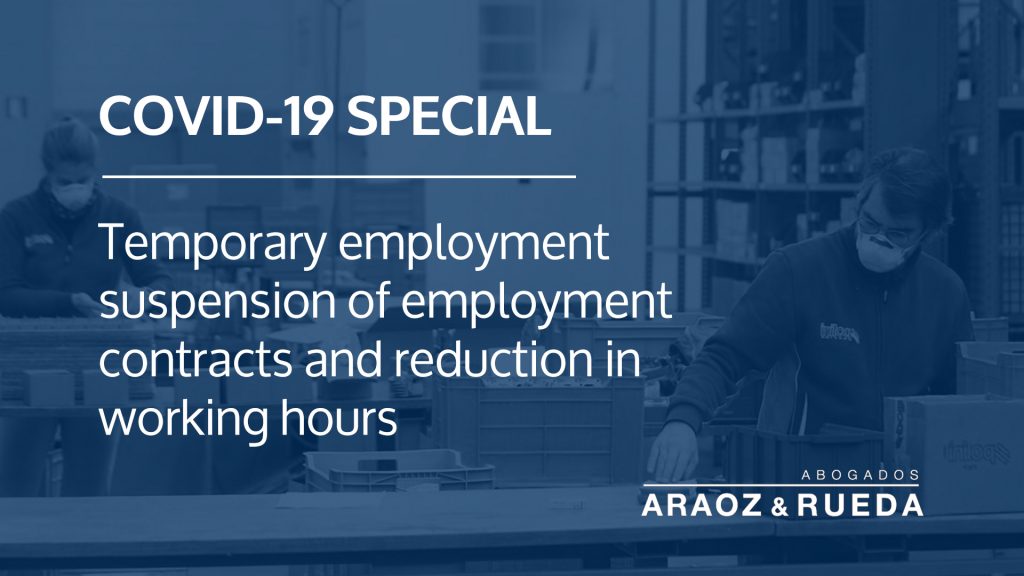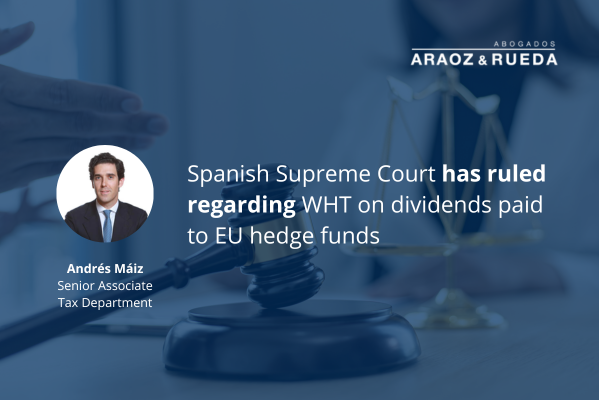Download the PDF document here
Nowadays, many companies are being forced to take/adopt measures to cope with the impact of Covid-19. From an employment-law perspective, among other measures, the vast majority of companies will have no choice but to carry out temporary layoffs based on suspension of employment contracts and reduction in working hours (the so-called, in Spanish “expediente de regulación temporal de empleo” or “ERTE”).
In addition to the Royal Decree 463/2020, of 14 March, which declared a state of alarm for the management of the health crisis caused by Covid-19, the Spanish Government has approved the Royal Decree-Law 8/2020, of 17 March, on urgent extraordinary measures to address the economic and social impact of Covid-19 (the “RDL 8/2020”), pursuant to which a wide range of extraordinary measures have been adopted to mitigate the economic and social consequences of Covid-19 and to prevent the economic impact from spreading beyond the duration of the health crisis.
The measures adopted by the Spanish Government cover different areas. However, in this document, we will focus on the particularities relating to the aforementioned temporary layoffs or “ERTE”, both due to force majeure and for economic, technical, organizational and productive reasons, as well as others measures related to contributions to the General Treasury of Social Security and unemployment protection. These measures will remain in force as long as the circumstances resulting from Covid-19 persist.
I. ERTE due to force majeure
The definition of force majeure has been adapted to the consequences of the Covid-19. According to RDL 8/2020, situations caused by force majeure are those that have their direct cause in:
- A loss of activity as a result of the Covid-19, including the declaration of the state of alarm, which entails the suspension or cancellation of activities, temporary closure of premises, restrictions on public transport and, in general, on the movement of persons and/or goods, lack of supplies which seriously impedes the ordinary course of business; or
- Urgent and extraordinary situations due to employees’ infection or to the adoption of preventive isolation measures decreed by the health authority, duly evidenced.
The ERTE procedure has been modified, as follows:
- The employer shall submit an application to the labour authority, together with a report linking the loss of activity to the consequences of Covid-19, as well as the relevant supporting materials. Likewise, the employer shall notify the employees of this application and provide the employees’ legal representatives, if any, with a copy of the mentioned documentation.
- Within 5 days from the submission, the labour authority will issue a resolution, which shall be limited to ascertaining the existence, if applicable, of the force majeure. The labour authority may previously request a report from the Labour and Social Security Inspectorate.
- Once the force majeure has been certified, the employer shall be responsible for the decision on the application of measures, which shall be effective as of the date of the event giving rise to the force majeure. Otherwise, the employer may challenge the decision before the social jurisdiction and/or initiate a (new) ERTE based on economic, technical, organisational or production grounds.
II. ERTE due to economical, technical, organisational and productive causes
Article 47 of the Workers’ Statute sets out the definition of economical, technical, organisational and productive causes. However, in connection with the last three causes, the Ministry of Employment has published a Guide in which it provides some examples, such as:
- A lack of enough stock or resources to continue with the business as a result of the Covid-19 effect on suppliers, or
- A decrease in demand, the inability to render its services or an excess of manufactured products resulting from the decrease in demand from client companies.
In this case, the procedure is as follows:
- The employer shall inform the employees’ legal representatives or, in their absence, the employees about its intention to initiate an ERTE based on aforementioned reason(s) and it shall request them to form a representative committee within 5 days.
- If there is no employees’ legal representatives, the committee shall be formed by the most representative trade unions of the sector, with standing to be part of the committee of the applicable collective bargaining agreement. The committee will be composed of one person for each of the trade unions that meet these requirements and decisions shall be taken by the relevant representative majorities. Failing to do so, the committee will be composed of three employees of the company, chosen according to the provisions of Article 41.4 of the Workers’ Statute.
- Once the aforementioned representative committee has been set up, the employer shall initiate the consultation period and must provide the necessary documentation to prove the existence of the cause(s) alleged. At the same time, the employer shall notify the labour authority. The consultation period shall not exceed 7 days.
- In case of an agreement is reached, the employer shall notify the labour authority, providing it with a copy of the agreement. Moreover, in any case, the employer shall inform the labour authority and the employees’ legal representatives about its decision in connection with the temporary layoff, as well as to the affected employees. The decision shall take effect from the date of its communication to the labour authority.
- In the absence of an agreement, the employer shall decide on the suspension/reduction of working hours. In any event, its decision can be challenged.
III. Contributions to the Social Security General Treasury (*)
In the framework of an ERTE due to force majeure related to Covid-19, the Social Security General Treasury will exempt the employer from the payment of the employer’s contribution provided for in Article 273 of the General Social Security Law Security, provided that, on 29 February 2020, the company has fewer than 50 employees. For those companies with 50 or more employees at that time, the exemption will be up to 75% of the employer’s contribution. This exemption will be applicable during the period of validity of the ERTE and will cover the payment of contributions for joint collection items.
IV. Unemployment protection (*)
The Public Employment Service will recognize the right to the contributory unemployment benefit for the affected employees. Therefore, affected employees will be entitled to the unemployment benefit, even though they fall short of the minimum contribution period.
Likewise, the period in which employees receive an unemployment benefit as a result of these extraordinary circumstances will not be computed as regards the maximum periods of unemployment benefits legally established.
V. Obligation to maintain employment.
According to the Sixth Additional Provision of the RDL 8/2020, the extraordinary employment-related measures shall be subject to the company’s commitment to maintain employment for a period of six months following the date of resumption of the activity.
(*)Pursuant to the First Transitory Additional Provision of the RDL 8/2020, the extraordinary measures regarding social security contribution and unemployment protection will be applicable to employees affected by any ERTE communicated, authorized or initiated prior to the entry into force of the RDL 8/2020, provided that they derive directly from Covid-19.





